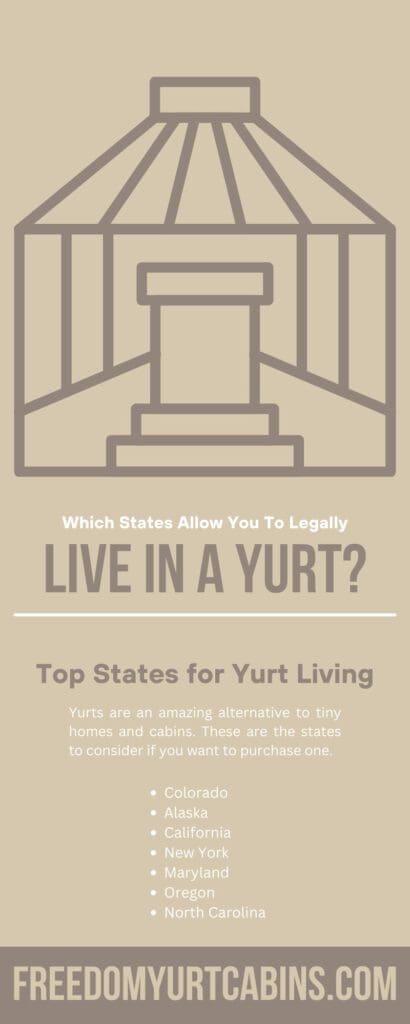Dreams of a simplistic lifestyle closer to nature whisper to the heart of the modern wanderer. Enter the yurt. This circular structure is perfect for people who want to immerse themselves in nature and potentially live off-grid. You may wonder, which states allow you to legally live in a yurt? We’ll answer this question and explore the legalities of yurt living in the blog below.
Top States for Yurt Living
Yurts are an amazing alternative to tiny homes and cabins. These are the states to consider if you want to purchase one.
- Colorado
- Alaska
- California
- New York
- Maryland
- Oregon
- North Carolina
The Yurt Resurgence and Its Legal Canvas
Fueled by the tiny house movement, ecotourism, and a growing interest in minimalism, yurts have become an emblem of harmonious living with the environment—their aesthetic appeal and potential as portable, lightweight homes are significant in their renaissance. Yet, from coastline views to remote mountain nooks, the terrain of the legal landscape varies wildly for those considering a yurt home.
Breaking Down the State Line Barrier
Location should be the first consideration on your yurt customization checklist. While the allure of the yurt is its transient nature, your address still dictates where you can legally raise your circular sanctuary. Despite the nomadic tradition of yurts, modern building codes and zoning laws have their say.
Surveying the Yurt Horizon
Each state’s code is not created equal. Varying from strict to lenient, these codes affect things like yurt size, permitted land use, and even the type of yurts allowed. The process can be complicated and nuanced, requiring due diligence on the part of the yurt seeker.
Washington State holds a reputation for yurt-friendly policies, with a clear guideline on what a yurt should be—no larger than 900 square feet and equipped with standard utilities. New York doesn’t require a permit to build the hard-sided yurt since the state considers them temporary housing. You must follow local codes if you add permanent conveniences, such as electricity and plumbing.
Permit Pioneers
Even states that are welcoming to yurts have their hoops to jump through. Colorado, for instance, requires a simple building permit if the yurt adheres to specific safety standards and the property’s infrastructure can support it. Contrast this with Alaska, where the process involves several steps, including meeting a certified engineer’s requirements.
The ambiguity in the law is both a hindrance and an opportunity. It leaves room for negotiation on the limits of yurt living, but it also means that the yurt’s future can be as uncertain as its past in more conservative states.
Crafting the Yurt Life Legally
Individual tastes, needs, and beliefs color each yurt-style abode, but legality leaves the biggest footprint on its design. Here’s how the requirements of the circular dwelling vary.
Zoning
Zoning laws dictate where the home can take root for those setting up their yurt. The good news is that many states have friendly residential zoning for yurts. For instance, California’s state laws on accessory dwelling units (ADUs) have inadvertently embraced yurt-dwelling, making getting the green light for your unusual home easier.
Foundation
Yurts are flexible, but some states require owners to build them on permanent foundations. A noteworthy mention is Oregon, where yurts can stand on various foundations, from concrete slabs to treated timber posts, demonstrating a practical and adaptable approach.
Regulations
Builders must be flexible in the world of yurt living, dancing within the lines of regulations that often do not anticipate their form of living. This flexibility can appear daunting initially, but it’s also a chance for the yurt community to advocate for what and where they live.
Yurt Benefits
Yurt life is more than legality; it’s a philosophy embodied in the fabric of the dwelling itself. Here are the aspects of yurt life that make it a legal and thriving mode of living.
Economical Advantages
Yurt living brings a glimpse of financial freedom for the frugal and the finance-conscious. The considerably lower cost of yurt construction and maintenance and less space to heat and cool make it a dream for the economically savvy.
Ecological Envisioning
The environmental argument for yurts often stands as a centerpiece in the advocacy for their use. They require fewer resources to build, create a smaller ecological footprint, and encourage a closer relationship with the natural world. States that permit yurts often appreciate their role in sustainability, connecting legality with environmental ethics.
Flexibility and Family
Legality isn’t the end of the yurt’s tale. Its portable nature and minimalist lifestyle are a beacon for those who value flexibility. Yurts require minimal land, which often goes hand-in-hand with state laws that are accommodating, recognizing the need for varied living arrangements that can adapt to families and career paths.
Natural Connections
Living in a yurt means living closer to nature. The circular structure and the materials it consists of feel almost biomimetic, an extension of the natural world. States with emancipated yurt dwellings tend to value a connection to the outdoors.
Final Thoughts
The legal yurt map is as varied as the United States’ terrain itself for the yurt-dweller or the curious onlooker. There’s potential for a wider acceptance of yurts as legal dwellings, but this acceptance requires advocacy, education, and a willingness to engage with the laws that govern them. Yurt living may have challenges, but the blend of sustainability and simplicity is rewarding for many.
Those who find themselves drawn to the circular lines of the yurt must keep their spirits resilient. Engage with local officials, seek the counsel of the yurt collective, and learn more about which states allow you to legally live in a yurt. The circle of legality may yet widen, allowing more North Americans to experience the harmony of living within the yurt’s enigmatic walls.
Ultimately, the legality of yurts is not merely a legal journey; it’s a reflection of shifting societal and environmental values. The yurt is a home, a philosophy, a sustainable solution, an architectural marvel, and a piece of living history. It is a testament that some of the oldest and most resilient designs can pave the way to the future. The privilege of selecting “yurt” as your housing choice on a lease or residency form remains elusive to many, but as the saga of yurt laws unfolds, the potential for this to change remains as circular as the homes we adore.




No responses yet